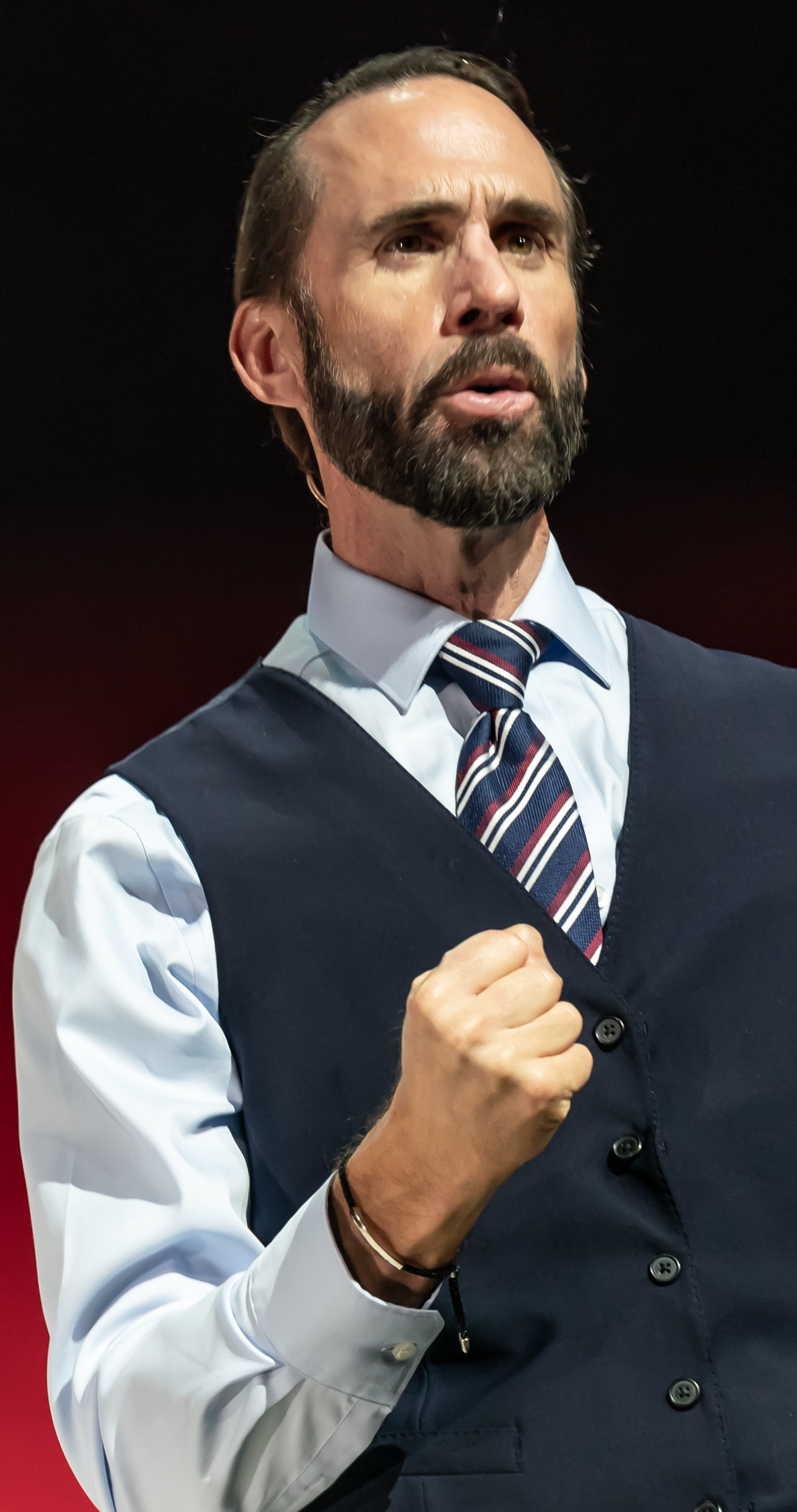Dear England, Prince Edward Theatre review - still a winner in its new West End home | reviews, news & interviews
Dear England, Prince Edward Theatre review - still a winner in its new West End home
Dear England, Prince Edward Theatre review - still a winner in its new West End home
James Graham's play works like a big joke that a whole nation is in on

It was interesting, in the same week that the England football team trounced Italy 3-1 in a Euros qualifier, to see Dear England again, the National Theatre smash that has just embarked on a West End run at the Prince Edward Theatre.
One of the three goals was a penalty scored by captain Harry Kane. England manager Gareth Southgate’s task of fixing the England team's woeful record on that score seems to be complete: England have overcome their fear of penalties.
No England fan would be that confident, however, and James Graham’s play, among other things, spells out why. Buried under all the swagger of the standard English attitude to its football team – whose inherent brilliance some believe in as intensely they do in the imperial might of the England of old – lies a deep-rooted and debilitating fear of failure, Graham suggests. And not just among the fans: the players themselves are brought low by this feeling, too, unexpectedly skying or scuffing the ball when they are on the penalty spot. Southgate (Joseph Fiennes, pictured below, left), whose traumatic fluff in 1996 has never been forgotten (or forgiven in some quarters), has to face his own trauma alongside his team.
 His lengthy "Dear England" letter to the country, released online in June 2021, urging tolerance and understanding, supplies Graham with the key message of his play: it’s not just about winning, it’s about how you lose the game. Lose fearlessly and honestly, and you are still a role model.
His lengthy "Dear England" letter to the country, released online in June 2021, urging tolerance and understanding, supplies Graham with the key message of his play: it’s not just about winning, it’s about how you lose the game. Lose fearlessly and honestly, and you are still a role model.
Of course, Southgate was vilified for this attitude by those who liked to brand him as “woke” and caused mayhem in the streets when England lost. Worse, they directed monkey-chants at Black players and piled onto them online. Raheem Sterling (Kel Matsena) gets a stirring anti-racist speech, after which the team take the knee at each match.
Urged on by the sports psychologist Pippa Grange (new cast member Dervla Kirwin, playing her as an Aussie) whom Southgate has appointed amid much derision, we see the players gradually begin to open up and be more concerned for each other’s welfare. The word “love” starts to appear in their dialogue. They start to score penalties. A nation dares to hope.
This amiability and positivity give the play its warm core and its gentler satirical elements (there are also some broader, less welcome moments featuring a cartoonish Theresa May, Boris and Liz Truss taking penalties, all missing). The evening plays like a big joke that a whole nation is in on, viz the moment when Gary Lineker (Gunnar Cauthery) comes onstage munching a bag of Walker’s crisps, and the audience immediately gets it. Even more noise greets Crystal Condie as coach Sarina Wiegman when she walks on with the England women’s World Cup trophy.
At the centre of this joke are two men whom the English seem happy to ridicule. Southgate, the man in a waistcoat who’s proud to come from Crawley, is a natural target – you only have to be an England manager to suffer that fate. Fiennes so inhabits the role, every vowel sound and head tilt uncannily right, that you fear for the person who has to substitute for him. It’s an extraordinary performance that balances caricature with a thoroughgoing understanding of Southgate’s innate decency.
Just as vital to the success of the whole, though, is Will Close’s Harry Kane (pictured below). Kane is rich pickings, an endless source of dopey pronouncements, but Close, too, finds the real person, a passionate captain who grows before our eyes. HIs kindness is palpable, his leadership skills admirable and his distress at missing a key penalty in the World Cup quarter final in 2022 genuinely moving. The man who knows what that feels like gives him a big managerial hug.
 Rupert Goold’s production has made the move from the Olivier, with its wide stage and revolves, with maximum success. Es Devlin’s simple set is still a winner, its white overhead giant oval of light, which can rise and lower, both evoking the Wembley arch and a sense of an interrogatory spotlight focused on the team. They return barring two members of the first cast, with Griffin Stevens now playing iron-headed Harry Maguire and Denzel Baidoo as bible-reading Bukayo Saka. Around the rim of the oval, backgrounds are spectrally projected and scores are registered, along with stills and clips of previous England goofs (and the solitary big World Cup win in 1966 that still stalks the English psyche).
Rupert Goold’s production has made the move from the Olivier, with its wide stage and revolves, with maximum success. Es Devlin’s simple set is still a winner, its white overhead giant oval of light, which can rise and lower, both evoking the Wembley arch and a sense of an interrogatory spotlight focused on the team. They return barring two members of the first cast, with Griffin Stevens now playing iron-headed Harry Maguire and Denzel Baidoo as bible-reading Bukayo Saka. Around the rim of the oval, backgrounds are spectrally projected and scores are registered, along with stills and clips of previous England goofs (and the solitary big World Cup win in 1966 that still stalks the English psyche).
On the team, a standout is Josh Barrow’s Jordan Pickford, the England goalie, whose jittery bouncing in front of the net, his arms wide in a crucifixion pose, his feet splayed out, catches the man exactly. The choreography of the piece (by Ellen Kane and Hannes Langolf) is impressive throughout, setting up the intricate moves of the team on the pitch as forcefully as the street scenes of rioting/celebrating, depending on the match result. When John Hodgkinson comes on as Gianni Fantini, president of Fifa, and does a mad, bendy dance, I wished there were even more of it in the piece. As it is we get the team, spurred on by Kane’s dad-dancing, all twerking and doing the Sprinkler in a perfect show of solidarity.
Yes, at times Southgate’s ruminations are on the “woke” side, and his pronouncements verging on “soft” (as we see ex-footballer Matt Le Tissier claiming), and the script and pacing could usefully be tightened here and there. But this is still a terrific evening of navel-gazing that the nation has to keep doing, in search of an answer to what it means in these post-Brexit days to be not just an England footballer, but English. The two, for Graham, are one thing. For Kane, this means not caring what others think: take out your false teeth and dance with them as England player Nobby Stiles did after the win of ’66. Be More Nobby, he urges, a slogan that deserves a bumper sticker.
The future of Arts Journalism
You can stop theartsdesk.com closing!
We urgently need financing to survive. Our fundraising drive has thus far raised £49,000 but we need to reach £100,000 or we will be forced to close. Please contribute here: https://gofund.me/c3f6033d
And if you can forward this information to anyone who might assist, we’d be grateful.

Subscribe to theartsdesk.com
Thank you for continuing to read our work on theartsdesk.com. For unlimited access to every article in its entirety, including our archive of more than 15,000 pieces, we're asking for £5 per month or £40 per year. We feel it's a very good deal, and hope you do too.
To take a subscription now simply click here.
And if you're looking for that extra gift for a friend or family member, why not treat them to a theartsdesk.com gift subscription?
more Theatre
 The Gathered Leaves, Park Theatre review - dated script lifted by nuanced characterisation
The actors skilfully evoke the claustrophobia of family members trying to fake togetherness
The Gathered Leaves, Park Theatre review - dated script lifted by nuanced characterisation
The actors skilfully evoke the claustrophobia of family members trying to fake togetherness
 Edinburgh Fringe 2025 reviews: Refuse / Terry's / Sugar
A Ukrainian bin man, an unseen used car dealer and every daddy's dream twink in three contrasting Fringe shows
Edinburgh Fringe 2025 reviews: Refuse / Terry's / Sugar
A Ukrainian bin man, an unseen used car dealer and every daddy's dream twink in three contrasting Fringe shows
 Faustus in Africa!, Edinburgh International Festival 2025 review - deeply flawed
Bringing the Faust legend to comment on colonialism produces bewildering results
Faustus in Africa!, Edinburgh International Festival 2025 review - deeply flawed
Bringing the Faust legend to comment on colonialism produces bewildering results
 Edinburgh Fringe 2025 reviews: Imprints / Courier
A slippery show about memory and a rug-pulling Deliveroo comedy in the latest from the Edinburgh Fringe
Edinburgh Fringe 2025 reviews: Imprints / Courier
A slippery show about memory and a rug-pulling Deliveroo comedy in the latest from the Edinburgh Fringe
 Edinburgh Fringe 2025 reviews: The Ode Islands / Delusions and Grandeur / Shame Show
Experimental digital performance art, classical insights and gay shame in three strong Fringe shows
Edinburgh Fringe 2025 reviews: The Ode Islands / Delusions and Grandeur / Shame Show
Experimental digital performance art, classical insights and gay shame in three strong Fringe shows
 Edinburgh Fringe 2025 reviews: Ordinary Decent Criminal / Insiders
Two dramas on prison life offer contrasting perspectives but a similar sense of compassion
Edinburgh Fringe 2025 reviews: Ordinary Decent Criminal / Insiders
Two dramas on prison life offer contrasting perspectives but a similar sense of compassion
 Edinburgh Fringe 2025 reviews: Kinder / Shunga Alert / Clean Your Plate!
From drag to Japanese erotica via a French cookery show, three of the Fringe's more unusual offerings
Edinburgh Fringe 2025 reviews: Kinder / Shunga Alert / Clean Your Plate!
From drag to Japanese erotica via a French cookery show, three of the Fringe's more unusual offerings
 The Two Gentlemen of Verona, RSC, Stratford review - not quite the intended gateway drug to Shakespeare
Shakespeare trying out lots of ideas that were to bear fruit in the future
The Two Gentlemen of Verona, RSC, Stratford review - not quite the intended gateway drug to Shakespeare
Shakespeare trying out lots of ideas that were to bear fruit in the future
 Edinburgh Fringe 2025 reviews: The Horse of Jenin / Nowhere
Two powerful shows consider the Israeli-Palestinian conflict, with mixed results
Edinburgh Fringe 2025 reviews: The Horse of Jenin / Nowhere
Two powerful shows consider the Israeli-Palestinian conflict, with mixed results
 Edinburgh Fringe 2025 reviews: The Fit Prince / Undersigned
A joyful gay romance and an intimate one-to-one encounter in two strong Fringe shows
Edinburgh Fringe 2025 reviews: The Fit Prince / Undersigned
A joyful gay romance and an intimate one-to-one encounter in two strong Fringe shows
 Tom at the Farm, Edinburgh Fringe 2025 review - desire and disgust
A visually stunning stage re-adaptation of a recent gay classic plunges the audience into blood and earth
Tom at the Farm, Edinburgh Fringe 2025 review - desire and disgust
A visually stunning stage re-adaptation of a recent gay classic plunges the audience into blood and earth
 Works and Days, Edinburgh International Festival 2025 review - jaw-dropping theatrical ambition
Nothing less than the history of human civilisation is the theme of FC Bergman's visually stunning show
Works and Days, Edinburgh International Festival 2025 review - jaw-dropping theatrical ambition
Nothing less than the history of human civilisation is the theme of FC Bergman's visually stunning show

Add comment